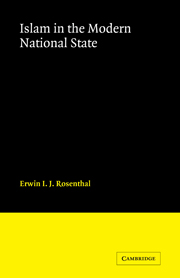Book contents
- Frontmatter
- Contents
- Introduction
- Acknowledgements
- Abbreviations
- Note on transliteration
- PART I CONTEMPORARY ISLAM IN CRISIS AND TRANSITION
- PART II ISLAM IN THE MODERN NATIONAL STATE
- SECTION I CONSTITUTIONAL ISSUES
- SECTION 2 CHANGES IN LAW AND THE EMANCIPATION OF WOMEN
- 12 Changes in Law
- 13 The Emancipation of Women
- SECTION 3 THE PLACE OF ISLAM IN NATIONAL EDUCATION
- Epilogue
- Notes
- Select Bibliography
- Index
- Frontmatter
- Contents
- Introduction
- Acknowledgements
- Abbreviations
- Note on transliteration
- PART I CONTEMPORARY ISLAM IN CRISIS AND TRANSITION
- PART II ISLAM IN THE MODERN NATIONAL STATE
- SECTION I CONSTITUTIONAL ISSUES
- SECTION 2 CHANGES IN LAW AND THE EMANCIPATION OF WOMEN
- 12 Changes in Law
- 13 The Emancipation of Women
- SECTION 3 THE PLACE OF ISLAM IN NATIONAL EDUCATION
- Epilogue
- Notes
- Select Bibliography
- Index
Summary
The constitutions which we have considered have afforded us as nearly as circumstances allow to discover what kind of a state Muslims in the countries visited are building after victory over foreign domination or tutelage. While discussing these constitutions, we have drawn certain conclusions largely based on the law in force and on the attitudes and views of different groups of citizens of modern national states which they hold in respect of the Sharī‘a of Islam. The question of change and adaptation had to be treated in general with as much detail as was necessary in order to illustrate these differences. Now it remains to describe summarily some changes in more detail, changes which concern personal status law which, to repeat, has always been that part of the Sharī‘a which was observed by all Muslims. One of the main reasons for this hold of tradition throughout the ages is naturally that it was connected with religious customs even though marriage in Islam is primarily a legal contract followed by a religious ceremony. Divorce and inheritance are also legally regulated. Another no less important reason was that personal status law was outside and far removed from politics. It need therefore not be disturbed and, moreover, together with cult and ritual preserved the religious character of the personal and, often also, of the social life of Muslims.
- Type
- Chapter
- Information
- Islam in the Modern National State , pp. 332 - 337Publisher: Cambridge University PressPrint publication year: 1965



